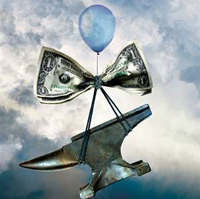Europe feels the bite as US dollar plummets
Euro zone finance ministers called Monday on China to reduce its massive surplus and welcomed U.S. comments defending the dollar.

"In emerging economies with large and growing current account surpluses, especially China, it is desirable that effective exchange rates move so that necessary adjustments will occur," the 13 nations said in a joint statement read out by Luxembourg Prime Minister Jean-Claude Juncker.
"We have noted with great attention that a strong U.S. dollar is in the interest of the U.S. economy," he said, adding that ministers would continue to watch exchange rate markets closely.
Juncker did not join some ministers, such as Germany's Peer Steinbrueck, Austria's Wilhelm Molterer and Dutch colleague Wouter Bos in saying a strong euro reflected a strong European economy that could ride out problems.
Europe is starting to feel the bite as the U.S. dollar plummets, making French wine, Italian fashion and German cars expensive purchases for the EU's main export market in the U.S.
Last week, the employers' federation BusinessEurope said that, by crossing 1.40 against the US dollar, the euro exchange rate had reached a "pain threshold" for European companies.
Finance ministers from the United States, Japan, Canada, France, Germany, Britain and Italy meet for talks on the global economy on Oct. 19-22.
Outgoing International Monetary Fund Director Rodrigo Rato worded his concerns more strongly in a Financial Times interview on Monday, saying the U.S. dollar was undervalued and governments needed to keep an eye on global imbalances.
Since the currency's launch in 2002, the European Commission has urged the nations that use the euro to do more to coordinate their economic moves and cut spending.
It says the euro is already paying off because the euro zone has become more resilient to outside shocks, such as last year's oil price spikes.
But the possibilities of a worsening U.S. slowdown, higher oil prices and tighter borrowing conditions could all risk derailing Europe's first bloom of growth after several years of stagnation.
The EU executive has cut its forecast for the economy to grow this year from 2.6 percent to 2.5 percent after global financial turmoil sparked by mounting bad loans to U.S. homeowners, the AP reports.
The dollar is near record lows against the euro and has weakened considerably against several other major currencies, but officials in Washington are reacting with almost contented silence.
Less than two weeks before finance ministers from the Group of 7 leading industrial nations are to meet to discuss economicpolicy,European officials are grumbling about the weakened dollar because it makes American exports cheaper in world markets.
Jean-Claude Trichet, president of the European Central Bank, reiterated on Monday that he was paying “great attention” — a week ago he spoke of his “extreme attention” — to American statements in support of a “strong dollar.”
But while the mantra of the Bush administration remains that a “strong dollar is in our nation’s interest,” that formulation has not changed in the last five years as the dollar gradually lost about a third of its value against the euro.
On Tuesday, the euro settled in New York at a rate of $1.4098 — slightly below its record high a few days ago. In January 2002, the euro was worth around 86 cents.
Indeed, when the dollar’s slide accelerated after the Federal Reserve lowered interest rates on Sept. 18, American officials barely even repeated the strong-dollar formulation.
“They don’t really care what the dollar does, at least within a fairly wide range,” said Adam S. Posen, deputy director of the Peterson Institute for International Economics in Washington. “What the U.S. government cares about above all is that the changes are orderly.”
Since the dollar began declining again three weeks ago, the Treasury secretary, Henry M. Paulson Jr., has mentioned a strong dollar only once — on Sept. 21, in a trip to Canada, just as the American currency was dropping to parity against the Canadian dollar for the first time in three decades. Yesterday, the Canadian dollar settled at $1.0169.
“I feel very strongly that a strong dollar is in our nation’s interest,” Mr. Paulson said then, “and we believe that currency values should be set in a competitive marketplace based on underlying economic fundamentals.” In practice, analysts said, the administration’s position has effectively been that a strong dollar is whatever value the foreign exchange markets settle on.
By contrast, Mr. Paulson has repeatedly expressed satisfaction that American exports have climbed by about 15 percent in the last year, a trend that has been helped by the weaker dollar.
Analysts see little mystery in the American position: at the moment, a weaker dollar offers more benefits than a stronger one. The cheaper dollar offers a lift to American exporters by making their products competitive in many parts of the world. And while a weak dollar usually makes imports expensive, import prices have so far climbed less than other currencies’ values because foreign producers have kept prices low to preserve market share in the United States, the New York Times reports.
Source: agencies
Subscribe to Pravda.Ru Telegram channel, Facebook, RSS!




